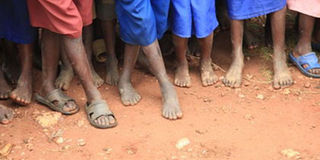Prime
Being poor doesn’t make one corrupt

There is no sufficient proof to show that corruption originates from a poverty situation.
What you need to know:
- Morris Komakech says: Being a child of a poor person does not make one less committed to the nation.
We, children of the poor detest Mr Museveni’s baseless accusation that we are corrupt. Museveni declaring that the NRM will continue to employ our former playmates from rich families is in bad taste and violates our constitutional rights as equal citizens.
In fact, blaming children of the poor may even confirm an act of sectarianism as stated in Section 41 of the Penal Code.
Museveni observes that children from wealthy families are least corrupt, probably even more patriotic, and least problematic than the poor majority. The contrary is true!
Many children of the rich are lavished with jobs at home and internationally. Most live in excess from the proceeds of their parents.
They skirt international skies and have purchased prime real estate (properties), and businesses abroad. They even operate accounts in foreign countries as a measure of their affluence!
These are luxuries that preclude children of the poor. The so-called rich educate their children abroad, moreover on government scholarships that should benefit the poor.
We all know that the root causes of this endemic corruption cannot result from the inadequacy of children of the poor.
Being a child of a poor person does not make one less committed to the nation, a seeker of quick aggrandisement, or without work ethics. This way of thinking is itself corrupt and it starts and ends with this regime.
The real driver of corruption lies in the manner that our social, economic, and political spaces are often contested. We have argued that the history of violence and periodic vote-rigging undermines the public ability to hold government officials accountable.
The breakdown in social services, mostly marketised, has largely created an unequal and predatory society that suppresses poor families more. But poor families do not own the means to control resources in the mafia-studded public or private sector.
The role of a responsible government is to recognise and make efforts through robust public policies to redistribute social and economic resources. Our regime, instead victim-blames the poor, and uses outrageous tax systems to exploit and widen the gap between the poor and the rich.
The real elephant in the room, though, is the sectarianism with which government jobs, contracts, scholarships, and appointments have been distributed .
Children of the poor are constantly at the margins of employment excluded by design. Those who gain jobs endure intense social exclusion and insecurities.
Commentators have linked sectarianism to organised crime and the birth of mafiaism that is consuming Uganda’s conscience. The level of organised corruption in Uganda outstrips the ability of a poor child to grapple with and participate in.
Often, it is the underprivileged person who pays the price for a connected boss. The whole process where public resources get diverted to the rich happens openly and yet the mechanisms are intricately complex involving the deep state. Such shameless corruption cannot happen without State patronage.
Imagine someone enriching self by reducing a road lane for kilometers, over-inflating costs in government procurement, pre-determining layout for infrastructure developments. These are no feat for poor sons of this land.
Morris Komakech , [email protected]




